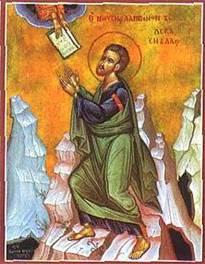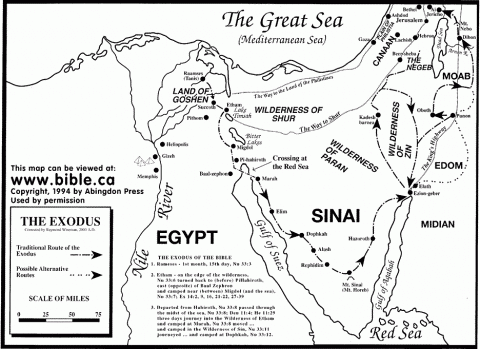Moses #2 (later life)
MOSES #2
Possible Lesson Plan:
- Open with prayer.
- Scripture Reference: Exodus 16, 19-20, 32 and Numbers 13-14, 20-21, Deuteronomy 34. Again, a lot of reading. Again, cut apart these references and have students read them aloud in this order:
Manna Exodus 16: 1-4, 31
Water from a rock Exodus 17: 1-7
Mt. Sinai Exodus 19:3-6, 16-20
10 Commandments Exodus 20: 1-17
Golden Calf Exodus 32:1-5, 15-24
Ark of the Covenant Exodus 25: 10-16
Sending of the spies Numbers 13:23-33
Aaron’s Rod that budded Numbers 17:21-26, 18:1-2
Fiery Serpent Numbers 21:4-9
View from Mt. Nebo Deuteronomy 34: 1-4, 9-12
- Continue your time line cards with the following:
Manna Mt. Sinai
10 Commandments Golden Calf
Sending of the spies Water from a rock
Fiery Serpent View from Mt. Nebo
Follow the path of Moses on the map.
- Service References: Again we find the services of the church replete with references to the later exploits of Moses. At the feast of the Transfiguration, Exodus 24:12-18 and Exodus 33:11-34:8 are read. Of course, Moses and Elijah are seen with Jesus by the apostles at Transfiguration as in vespers: “The shining cloud of the Transfiguration has taken the place of the darkness of the Law. Moses and Elijah were counted worthy of this glory brighter than light and taken up within it…”, “Moses who saw God and Elijah who rode in the chariot of fire …beheld Thee in the cloud at Thy Transfiguration, O Christ, and they testified that Thou art the maker and the fulfillment of the Law and the prophets”, “Thou hast appeared to Moses both on the Mountain of the Law and on Tabor: of old in darkness, but now in the unapproachable light of the Godhead”, and “Talking with Christ, Moses and Elijah showed that He is Lord of both the living and the dead, the God who spake of old through the Law and the prophets.” Who represents the Law? The prophets?
God led the Israelites in the wilderness by a pillar of fire by night and a cloud by day. But, their gratitude is spoken to by the Lord in the Royal Hours: “And how have you now rewarded me? By returning evil for good. For the pillar of fire you nail me to the cross. For the cloud you dig me a grave.” How is the cross a pillar
of fire? The cloud, a grave?
God provided manna for the Hebrews to eat. Judas is seen as their son on Great and Holy Thursday with “In truth Judas is son of the vipers who ate the manna in the wilderness, and murmured against the Nourisher; for those ingrates, while food was still in their mouths, murmured against God. Similarly, this wicked one of false worship, while the heavenly Bread was still in his mouth, conspired to deliver the Savior.” And Jesus speaks to the Jews in the Royal Hours of Holy Friday, “My people, what have I done to you, and how have you repaid me? Instead of manna, gall; instead of water, vinegar.” He also provided water, which prefigures the water that flowed from the side of Jesus at his crucifixion: “Thy side was pierced, O Savior, like the rock of flint in the wilderness; but Thou hast poured forth a stream of living water, for Thou art the Fount of Life.” And in Ode three of the Paschal Canon: “Come let us drink, not miraculous water drawn forth from a barren stone, but a new vintage from the fount of incorruption, springing from the tomb of Christ.” The story of the waters of Marah, when Moses cast the tree into the waters and they became sweet, is read at the feast of the Holy Cross, with the explanation at matins, “In like manner of old did wood once destroy the bitterness of the waters of Marah, prefiguring the strength of the Cross that all the powers of heaven magnify.” In what way does each of these incidents – the manna, the water from the rock, and the waters of Marah – prefigure Christ? St. Andrew of Crete in his canon, sung during the first week of Great Lent, laments that we are much like the Israelites “Like Israel of old you have an arrogant will, O my soul, preferring gluttony and self gratification to the manna from heaven. The Canaanites' wells can be likened to worldly philosophies, from which you, my soul, have preferred to drink rather than from the rock from which when struck by Moses there poured out a river of wisdom, the knowledge of God. Like the arrogant Israelites in the wilderness, you prefer the comforts of Egypt and unclean food to manna, the food sent from heaven. Water pouring from the rock when struck by Your servant Moses, prefigured Your life giving side, O Saviour, from which we saw the Water of Life.
God gave the Law to Moses, the same Law that He Himself obeyed at the Meeting of the Lord. At Vespers, “Today He who once gave the Law to Moses on Sinai submits Himself to the ordinances of the Law,” and at matins “He who is borne on high by the cherubim and praised in hymns by the seraphim, is broug

ht today according to the Law into the holy temple and rests in the arms of the Elder as on a throne. From Joseph He receives gifts fitting for God: a pair of doves, symbol of the spotless Church and of the newly-chosen people of the Gentiles; and two young pigeons, for He is the Originator of the two Covenants, both Old and New.” How are the 2 covenants different?
Aaron’s rod budded, choosing his line as priests according to Numbers 17:8. The cross of Christ in the matins of the feast of the Exaltation is compared to Aaron’s rod with “The rod of Aaron is an image of this mystery, for when it budded it showed who should be priest. So in the Church, that once was barren, the wood of the Cross has now put forth flower, filling her with strength and steadfastness.” And at the Nativity of the Theotokos, Mary is the “spotless branch of the root of Jesse, that brought forth Christ as flower.” The Cross is also prefigured in Exodus 17 when Moses “stretched out his arms in the form of a cross, the people became strong again” and Amalek was put to flight. Furthermore, the story of the serpents from Numbers 21 is referred to in matins of the Holy Cross with “Moses set upon a wooden pole a cure against the deadly and poisonous bite of the serpents: for crosswise upon the wood – as a symbol of the Cross – he placed a serpent that creeps about the earth, and thereby he triumphed over calamity.” In what way does each of these – Aaron’s rod, the battle with Amalek, and the pole of the serpent – prefigure the Holy Cross?
And, finally we arrive at the Ark of the Covenant, commanded by God for Moses to build. In it were placed the 10 commandments and Aaron’s rod. A tabernacle was built for the ark. Exodus 40 is read at the vespers of the Entry of the Theotokos. Why? Mary is called the “Heavenly Tabernacle” in a multitude of services, and here, at matins, “The Temple of God, the heavenly Tabernacle, accomplished her entry into the temple of the Law, and from her light has shone on us in darkness.” Mary says to the angel at Annunciation, “The descent of the Holy Spirit has purified my soul and sanctified my body: it has made of me a Temple that contains God, a Tabernacle divinely adorned…” and at her Dormition “Thy Son, O Virgin, has truly made thee dwell in the Holy of Holies as a bright candlestick, flaming with immaterial fire, as a golden censer burning with divine coal, as the vessel of manna, the rod of Aaron, and the tablet written by God, as a holy ark and table of the bread of life.” How is Mary like the Tabernacle? The Ark?
4. Discussion: What is the role of law in our lives? Designate one wall of the room as your ruler and put up the letter “A” at one end and the letter “B” at the other. Ask the teens these questions and have them stand anywhere between A and B depending on how they feel about the answer.
Without laws, society would be A.more civilized B. less civilized.
Rules at school should be A.open to change B. strictly enforced
Laws should be made by A. vote of the public B. the wisest people
Rules in the family should be made by A.vote of all B. parents
Following God is more like A. keeping the rules B.freedom of choice
Have teens explain their answers before moving on to the next question.
What do you feel about the laws given to Israel in the 10 Commandments? Which ones seem unfair? Which is most important? Least? Why did God give Israel laws? Which is hardest to keep and why?
The book of Numbers could be called the book of the 40-year goof. Israel made multiple mistakes along their journey. From your reading, what are some of them? (grumbling about food, grumbling about water, golden calf) Finally, they didn’t believe God could give them the land of Canaan. Each mistake brought punishment of some kind. What? Israel kept making the same mistakes over and over – grumbling, complaining. What was the underlying mistake? (lack of trust in God, maybe, let the teens brainstorm) And the final result was the 40 years in the wilderness. It’s very hard to decide on fair punishment. What would be a reasonable punishment if you broke your curfew and didn’t call to say you’d be late? If you cheated on an exam? Was God fair to Israel? Why or why not?
We all make mistakes, too. Have students list some of their own blunders, either privately or on the board. Were there consequences? Were they fair? Did we learn anything from our mistakes? Or do we, like Israel, make the same mistake over and over? Do we have a particular area in our lives we seem to have great difficulty in overcoming?
5. Close with prayer: Moses intervened with God in prayer many times to save Israel. Agree to intervene in prayer this week for each other in the area where mistakes seem greatest.